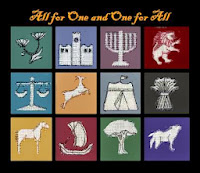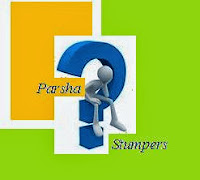Parshas Bamidbar - Parsha Stumpers

~ Something to Think About ~ במדבר f. פרשת Parsha Stumpers By: Daniel Listhaus Rashi (1:2) writes that the way Moshe counted B'nei Yisroel was through collecting a half-shekel per person. Why did he have count them like this? The passuk tells us that the people had to establish their genealogy according to their families. Rashi explains that they each brought documents of lineage and witnesses of their birth in order to precisely trace each one's ancestry. Why was this necessary? Why not just believe them in the first place? What is the significance of a flag? (5:1) Rashi notes that the passuk refers to Elazar and Isamar as the children of Aharon and Moshe – Aharon because he was their biological father, and Moshe because he was their rebbe. However, in the following passuk (3:2) it repeats and only calls them the sons of Aharon. Why should being someone's rebbe make one considered his father? Why is the passuk switching in the next passuk to just call them the sons of


